Unit 1 Your College Life
UNIT-1-College-Life-大学生活讲课讲稿

There seems to be no satisfactory explanation satisfying:令人感到满意的 satisfied:某人感到满意的 be ~ with sincerely:真诚地;真心地
➢ I sincerely hope you'll come with us.
Stereotype:
It is a form of generalization about some group of people. When people stereotyping others, they take a category of people and make assertions about the characteristics of all people who belong to that category.
Words and expressions
❖ accompany: vt.陪同,陪伴;伴随...发生; 她要求我陪她到机场去。
She asked me to accompany her to the airport. 闪电通常伴有雷声。
Lightning usually accompanies thunder. ❖ assured: 动词assure(使…确信)的过去式和过去分
Words and expressions
obtain: Further information can be obtained from head office.
pursue: Students should pursue their own interests, as well as do their schoolwork. pursue a career
Unit 1-College Life
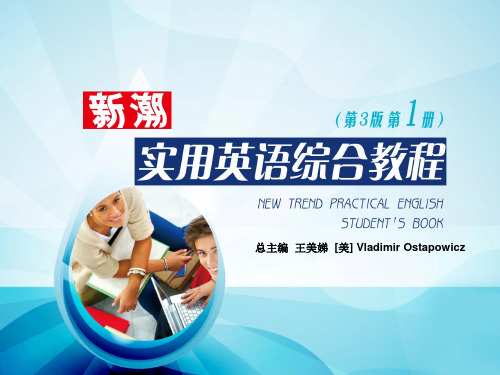
Ⅰ . Lead-in
Proverbs & Quotations
1. There is no royal road to learning. 学无坦途。 2. Where there’s a will, there’s a way. 有志者事竟成。 3. The more we study, the more we discover our ignorance. — Shelley, British writer 学然后知不足。 ——珀西〃 比希〃 雪莱(英国诗人) 4. If you think your teacher is tough, wait till you get a boss. He doesn’t have tenure. — Bill Gates 如果你认为你的老师严厉,等你有了老板再这样想。老板可是没 有任期限制的。 —— 比尔〃 盖茨 5. College is like a fountain of knowledge and the students are there to drink. 大学犹如知识的喷泉,学生上大学为的是畅怀痛饮知识的喷泉。
Richard:
Well, welcome to New York. OK, just a second. I’m almost ready here. Alexandra: Can I help you? Richard: Oh, please. Hold Gerald’s hand, please. Great! buildings . Terrific! Give Mommy Now point to the 5)_________ a kiss, Gerald. Nice! Thank you, Gerald. And thank you, Mrs.Vann. Mrs. Vann: Oh, my 6) pleasure _______. We’ll be looking for your book. Richard: Thank you. Good-bye. Bye, Gerald. Thanks again. Alexandra: Oh, you’re welcome. picture Richard: Hey, let me take your 7) _____________! Alexandra: Wonderful. Please. Richard: Are you from New York? Alexandra: No, I’m from Greece. I’m an exchange student. Richard: When did you come here? Three months ago. Alexandra: 8) ____________ Richard: Your English is very good. Alexandra: Thanks. I studied English in school.
新视野大学英语视听说教程【第二版】第1册第1课

II. Listening Skills: Listening for Names1. Doris: Good morning. Can I help you?David: Yes. I need to change one of my courses.Doris: I’ll see what we can do. What’s your name, please?David: My name’s David Brown.Doris: Your first name again?David: David. D-A-V-I-D.2. Nancy: Excuse me. I want to make sure if I am registered for the new semester of English withDr. Lang.Doris: Just a minute and I’ll check for you. What’s your name, please?Nancy: Nancy Leigh.Doris: Is “Lee” your last name?Nancy: No, it’s Leigh. L-E-I-G-H. But “Lee” would be easier to spell, wouldn’t it?3. Doris: I’m sorry. But if you need a loan, you’ll have to go to the Financial Aid Office beforeyou can register.Nancy: Them who should I see there?Doris: Well, Mrs. Vicky Klein can help you. As a matter of fact, anybody there is very nice. Nancy: Oh, thank you. What is her name again?Doris: Vicky Klein. V-I-C-K-Y, K-L-E-I-N.4. Doris: OK, to complete this form I need your name in full, please.Laura: Laura Tish Hill.Doris: Tish? That’s an unusual middle name. Would you mind spelling that for me?Laura: Sure. T-I-S-H. I was named after my mother.5. Doris: Well, you need to complete the form for your parking pass. Your name, please? Anthony: Anthony McDonald.Doris: Are you “Mc” or “Mac”?Anthony: “Mc”. My family was from Scotland.Doris: OK, Anthony. I’ll have your parking pass ready in a minute.III. Listening InTask 1: EnrollingGood morning, everyone. I’d like to welcome you to City University. I’m Betty Russell and I work in the International Students’ Office. I have some important information for you. First, you must enroll by August 28th. Pick up your ID card at our office. Then, you’ll need to pick up a library card so that you can borrow books from the library. Show them your ID card in the library and they will do it for you. You may be thinking about the sports facilities at our school. There’s no charge for student use, but of course you’ll have to show your ID card. Concerningthe medical assistance, the University has its own health center, and all services are free for enrolled students.Task 2: Living on CampusM: Hi, Lisa. How’s life on campus?W: Hi, John. Oh, not so bad. Pretty good in fact.M: Is that what do you think? I mean, do you like living on campus?W: Ye ah, I enjoy living here because there’s so many people around and it’s easy to make friends.What about you? Have you ever lived in a dorm before?M: No, this is the first time.W: I think you’ll find it quite convenient. The library, labs, sports center a nd other facilities are right on campus.M: That’s true. The atmosphere here is different from the outside. But I guess living in town has its advantages too, like being close to the shopping center. Y ou know, our university is so far from downtown.W: But the commuting to classes…I mean, you would have to get up so early to get to classes on time. And then going home would be so much time.M: Yeah, but the food here…it seems it’s the same thing in the cafeteria every day.W: Well, I think the food here is OK, and if you want a change, you can eat out once in a while. M: True.1.She thinks it’s easy to make friends.2.It’s convenient to use the library, the labs, the sports center and many other facilities.3.It’s near the shopping center.4.They would have to get up so early to get to classes on time. And then it would take a lot oftime to get home.5.It seems all the same every day.Task 3:Which comes first, day or night?There was a student who wanted very much to gain admission to a study course. He was smart enough to get through the written test and appear for the personal interview. Since the boy answered all the questions correctly, the interviewer decided to corner him. "Tell me your choice," said the interviewer to the boy. "I shall either ask you ten easy questions or one really difficult. Which option would you prefer? Think before you make up your mind." The boy thought for a while and said, "My choice is one really difficult question." "Well, you have made your own choice!" said the interviewer. "Tell me: Which comes first, day or night?" The boy was jolted first but he thought for a while and said, "It's the day, sir." "Why?" asked the interviewer. He was smiling. "Sorry, sir, but you promised me that you would only ask me one difficult question!" Admission to the course was thus secured.V. Let’s Talk: School is really hecticMichael: Hi! I saw you yesterday with John. We room together. I’m Michael.Jane: Oh, hi, Mike. How are you doing?Michael: I’m okay, but school has been really hectic since I came. I haven’t even had a chance to breathe!Jane: I know. It’s especially crazy when you’re a freshman. Hey, what’s your major? Michael: Travel and tourism.Jane: Well, what do you plan to do after you graduate?Michael: Uh… I really haven’t decided. I think I’d like to work for a travel agency in this area.What about you?Jane: Well, when I first started college, I majored in physics, but later I realized I might havea hard time finding a job in that field. I ended up changing to computer science. Findinga job in the IT industry shouldn’t be as difficult.Michael: Have you got a part-time job to support yourself through school?Jane: Well, I’m on a four-year scholarship that pays my tuition.Michael: Wow, lucky you!Jane: Yeah. How about you? Are you paying for school yourself?Michael: Sort of. I work weekends at a travel agency.Jane: A travel agency? That seems like a perfect experience for you! What do you do there? Michael: I’m a tour guide. I show tour groups around the city.Jane: Wow, your English must be pretty good then.Michael: Actually, they’re all Chinese tourists. That’s why I got the job!VI. Further Listening and SpeakingTask 1: University LifeUniversity life is a new and different experience for me. First of all, living at the university gives me a sense of responsibility, of being on my own. My parents aren’t around to say, “No, you’re not going out tonight.” I decide everything for myself. Being around lots of friendly people is another aspect I like about university life. On my first day, when I arrived on campus, I was a bit confused about where I was going. An upperclassman noticed me and asked, “Are you a new student?” When he found out I was looking for my dorm, he said, “Oh, just follow me; that’s where I’m going.” Now, I can really say that I feel comfortable in the dorm because there are so many friendly people around to talk with. Finally, I love having Fridays off; I would not be able to deal with five days of classes in a row. How did I do it in high school? I love sleeping in on Fridays. I guess I’m sort of a party animal, but it seems like I go out every Thursday night. It also seems like I don’t get home until early the next day! My head hits the pillow and I don’t move until Friday afternoon.Task 2: Listening EffectivelyThough it is 50% of everyday communication, listening, it seems, is the least taught. Listening ismore than just hearing: it requires understanding. In an educational setting, listening effectively is critical. Effective listening results in doing the right assignment, doing the assignment correctly, and taking notes effectively. Doing these activities well results in learning and, most of the time, good grades. In a professional setting, listening is also critical. When you receive an oral message, your response must be correct. If you fail to listen to customers or clients, you may lose their business, and your job! In a personal setting, listening effectively deepens your relationships. When we listen to someone, we say “You are important” wit hout ever speaking a word. When we fail to listen, not only do we not receive the message, but we send the message that we are just plain dumb.Unit testPart IQuestioin 1M:Hello, there. We've met at the registration office yesterday. If I remember clearly, you are Betsy Adams. You have the same first name as my little sister.W:Yes, I am. I'm so glad to meet you again.Q: What is the man's sister's first name?Questioin 2W:Hey, guys. Here is a letter for Bergkamp. "B-e-r-g-k-a-m-p". Any idea whose letter it is? M:It's mine. "Bergkamp" is my pen name.Q: What is the man's pen name?Questioin 3M:Hello, this is Tony Scott in the Lost and Found Office. What can I do for you?W:Hello. I'm a student in the PE department and I'm calling to check whether someone's found my ID card. My name is Tobey Hayden.Q: What is the woman's full name?Questioin 4W:I've registered for an optional course in French. The teacher gave me a French name "Yvonne". "Y-v-o-n-n-e".M:Wow, It sounds great. You're more international now.Q: What is the woman's French name?Questioin 5M:I heard that there are Chinese twin brothers in our university. Have you met them before?W:You mean the elder Raymond Lee and the younger Allan Lee? To tell you the truth, Allan Lee is in our class. He's a very kind person.Q: What is the elder brother's first name?Part IIW:Hello, John. How do you like your college life? Is everything all right?M:It couldn't be better.W:Oh, really? Tell me something about it.M:Well. It really makes me excited to meet so many friends here.W:So you must have made lots of good friends. Then how's your study?M:I love my major! It's quite interesting and the professors are all great. What about you? W:I'm just fine.Part IIIM:Well, hello! Long time no see!W:Uh, yeah.M:You look great, Helen.W:Oh, thank you, Ned, but I'm Tracy. You're looking good, too.M:Thanks. Oh, and my name is Ben.W:I'm sorry. Are you still working at that... that company?M:Yep, I'm still at the same company. How about you?W:Oh, I'm still a nurse.M:That's great. That's really great. I don't know any nurses.。
Unit 1 College Life 课件

为学生提供问答机会,澄清疑惑并进一步探讨相关的话题和问题。
3 行动号召
提供下一步的行动建议,鼓励学生积极参与和充分利用大学生活的机会。
大学生活:引领您的未来
本PPT课件旨在介绍大学生活的方方面面,帮助您更好地适应和享受大学生涯。 住
和室友一起生活的乐趣,还是出租房自由的 舒适?论述各自的优劣势和适应技巧。
运动和健身设施
探索校园内的运动设施,了解如何保持健康 的身体和积极的生活方式。
学生组织和社团
学习技巧
介绍不同的学习技巧和方法,提高记忆力和理 解能力,使学习更轻松高效。
学术支持服务
展示大学提供的学术支持资源,包括辅导中心 和学术顾问,帮助学生取得成功。
社交生活
1
结交朋友和建立人脉
分享结交新朋友和建立人脉关系的技
派对文化和饮酒
2
巧和策略,为未来的人生奠定坚实基 础。
探索大学派对文化,并讨论合理的饮
参与学生组织和社团的好处,展示大学生涯 中的各种精彩活动和社交机会。
就餐选择
介绍校内的餐厅和就餐选择,旨在满足不同 口味的食欲和饮食习惯。
学术生活
课程要求与期望
详细解释大学所要求的学分和学业要求,并提 供成功完成课程的秘诀。
时间管理技巧
为繁忙的学术生活提供实用的时间管理窍门, 以确保高效的学习和休息平衡。
简历和求职 信撰写
展示建立出色简历 和求职信的关键要 素,以脱颖而出并 获得理想的职业机 会。
面试技巧
分享面试所需的关 键技巧和策略,以 提高成功获取理想 职位的机会。
职业资源和 求职技巧
提供职业资源和求 职技巧,帮助学生 在竞争激烈的职场 中取得成功。
总结
大学英语(一)Unit1课文译文和练习
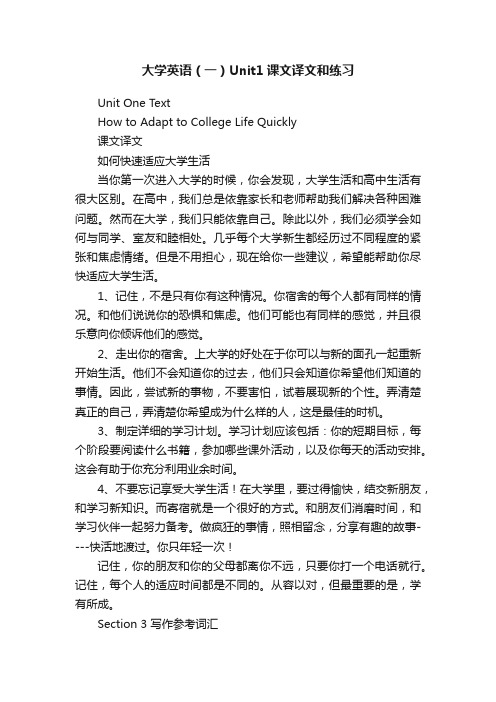
大学英语(一)Unit1课文译文和练习Unit One TextHow to Adapt to College Life Quickly课文译文如何快速适应大学生活当你第一次进入大学的时候,你会发现,大学生活和高中生活有很大区别。
在高中,我们总是依靠家长和老师帮助我们解决各种困难问题。
然而在大学,我们只能依靠自己。
除此以外,我们必须学会如何与同学、室友和睦相处。
几乎每个大学新生都经历过不同程度的紧张和焦虑情绪。
但是不用担心,现在给你一些建议,希望能帮助你尽快适应大学生活。
1、记住,不是只有你有这种情况。
你宿舍的每个人都有同样的情况。
和他们说说你的恐惧和焦虑。
他们可能也有同样的感觉,并且很乐意向你倾诉他们的感觉。
2、走出你的宿舍。
上大学的好处在于你可以与新的面孔一起重新开始生活。
他们不会知道你的过去,他们只会知道你希望他们知道的事情。
因此,尝试新的事物,不要害怕,试着展现新的个性。
弄清楚真正的自己,弄清楚你希望成为什么样的人,这是最佳的时机。
3、制定详细的学习计划。
学习计划应该包括:你的短期目标,每个阶段要阅读什么书籍,参加哪些课外活动,以及你每天的活动安排。
这会有助于你充分利用业余时间。
4、不要忘记享受大学生活!在大学里,要过得愉快,结交新朋友,和学习新知识。
而寄宿就是一个很好的方式。
和朋友们消磨时间,和学习伙伴一起努力备考。
做疯狂的事情,照相留念,分享有趣的故事----快活地渡过。
你只年轻一次!记住,你的朋友和你的父母都离你不远,只要你打一个电话就行。
记住,每个人的适应时间都是不同的。
从容以对,但最重要的是,学有所成。
Section 3 写作参考词汇faculty 学院department 系/部,institute 学院/研究院campus 校园,laboratory/lab 实验室auditorium 会堂/礼堂, gymnasium 体育馆/健身室information desk 咨询处library 图书馆art center 艺术中心clinic 医务室laundry room 洗衣室dining hall 食堂common room 公共休息室Administration Office 管理办公室computer center 计算机网络中心Student Accommodation Center 学生住宿管理中心audio-visual resource center 音像资料中心Law School 法学院Medical School 医学院Business School 商学院Faculty of EnglishLanguage and Culture英语语言文化学院Faculty of ElectronicEngineering电子工程学院Chemistry Department 化学系Faculty of Social Studies 社会学学院Mathematics Department 数学系Physics Department 物理系Physical Science Department自然科学系Management Institute管理学院Education Institute 教育学院Students’ Union学生会society社团registration form注册表membership application会员资格申请Recreation Center娱乐室Sports Hall 体育馆Activity Room 活动室playing fields 比赛场地tennis court 网球场football field 足球场volleyball 排球badminton 羽毛球racket 球拍Task 3 Give brief answers to the following questions. (p4)1. How do students solve all kinds of difficult problems at college?Students have to rely on themselves.2. How do most college freshmen feel when they first enter college?They experience some level of nervousness and anxiety.3. What does a detailed study plan usually include?It should include a student’s short-term goals, what books to read at a certain stage, what extra curriculum activities to participate in and daily activities.4. What is college about according to the passage?College is about having fun and making new friends as well as learning new knowledge.5. What could new students do when they are in need of help to adjust to the new environment?Just give a phone call to their friends and parents who are always ready to help.6. How do you adapt to your college life?OpenTask 6 Read the English sentences and translate the Chinesesentences into English.( P6)1. What's more, we should learn to live independently.What's more, we lack necessary experience.2. Chances are that man will eventually land on Mars.Chances are that Grace will not come to the meeting.3. For this reason, many of his former friends turned against him.For this reason, I have decided to take teaching as my future career.4. This is a great time not only to learn new knowledge but also to developourselves in all aspects.This is a great time not only to relax oneself but also to experience new things.5. Reading English aloud in the morning will do you a lot of good.Cheating in an exam ruins one's personality.Section 4 Activity 2 Task 1 (p14)1) This is my friend Mary. She is a student at Binhai Technical School.这是我们的新老师史密斯先生,他来自澳大利亚。
Unit1 College life体验英语第一册第一单元

CHale Waihona Puke DAAt the registrar’s office
tuition 学费 receipt 收据 admission letter 录取通知书 ID card = identification card 身份证 meal card 饭卡 library card 图书证 sign up 签名
1) Which class is Nicole in? A. Class Three. B. Class Two. C. Class Twelve. 2) What does Nicole need for enrollment except her
admission letter and ID card? A. A student card. B. A class schedule. C. A receipt. 3) What cards does Nicole get after enrollment? A. A student card, a meal card, and a class schedule. B. A meal card, a student card, and a library card. C. A meal card, a class schedule, and a library card.
2. required course 必修课
3. elective course 选修课
selective course
optional course
4. credit 学分 5. drop out 退学 6. get a refund 退款 7. withdraw 撤销
杰出的学者 outstanding scholars
Unit 1 How is your college life

Unit 1 How is your college life?Part1Speaking: Teacher’s self-introduction: name, major, teaching experience and hope and wishes for new students)Part2Speaking: Students’ self-introduction:Teacher put up 5 questions on the screen to help students to fulfill the task.(Remind students to give complete sentences to answer the question. The more, the better.)1.What’s your name?2.Where are you from?3.Why did you choose this university?4.What’s your major? Why did you choose it?5.How do you pay for school?6.What do you think is the most difficult when learning English?Teacher at first will ask students to do it with their desk mate for 5 minutes.Then teacher choose several students to give a presentation to check their performance. Teacher summarizes the task.Part3listening skillsListening for namesBefore listening, the teacher explains and pronounces new words for students.1.new words: Brown, Lang, loan, Scotland. (Other names: Christopher, David, James, Jason,Matthew, Michael, Robert and Steven)2.Ask students to speak out their English names.nguage and culture tips: registration office, parking pass, Financial Aid Office.4.Ask students to read the exercises for 7 seconds.5.Listen to the audio.6.Check the answers.Part4Listening inBefore listening, the teacher explains and pronounces new words for students.1.new words: enroll, Betty Russell, ID, facilitiesnguage and culture tips: enrolling3.Ask students to read the exercises for 7 seconds.4.Listen to the audio.5.Check the answers.6.If time permits, ask students the following questions: where does Betty Russell work? Beforewhat date must students enroll? What do the students need to pick up to borrow books from the library?...)Part5 Living on campusBefore listening, the teacher explains and pronounces new words for students.1.new words:Lisa, John, dorm, commute, cafeteria, eat out2.Ask students to read the exercises for 7 seconds.3.Listen to the audio.4.Check the answers.Part6WhBefore listening, the teacher explains and pronounces new words for students.1.new words:interviewer, corner, jolt, secure2.Ask students to read the exercises for 7 seconds.3.Listen to the audio.4.Check the answers.。
新时代大学英语第一册 Unit1 college life

New Words
• Attractive [ə'træ ktiv]
• a.吸引的,有吸引力的 • • • • Ice cream is attractive to children. 冰淇淋对孩子们非常有吸引力。 I think she is a very attractive girl. 我认为她是很有魅力的女孩。
New Words
• Serious ['siəriəs]
• adj.严肃的, 严重的
• Please be serious for a minute, this is very important. • 请严肃点儿, 这事很重要. His illness was more serious than the doctor first thought. • 他的病较医生原来以为的更严重。
实用大学英语综合教程1Unit 1 College Life
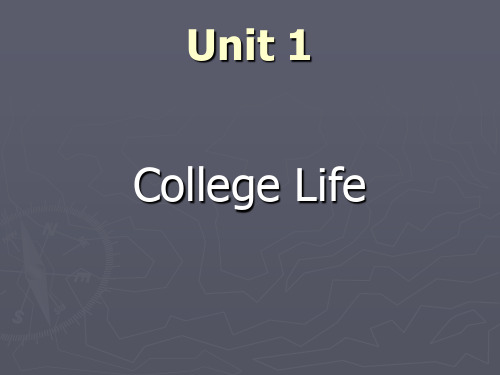
► vt.& vi.继承 ► vt.经遗传获得(品质、身体特征等),继任 ► If he dies without making a will, his closest
relative will inherit. 如果他没有立下遗嘱就去世了,他的至亲将成为 其继承人。 ► Our legal system inherited laws from the English system. ► 我们的司法体系沿袭了英国的法律体系。
► way ► adv.远远地,大大地 ► It's
way past your bedtime.
你早该睡觉了。
► Para
9 ► Challenge yourself academically ► It means “ to study hard” ► challenge: 挑战 ► academically: 在学业上
很难万事如意。
It turned out that I knew the person who got shot.
结果发现我认识那个中枪的人。
► visualize ► vt.形成思维图像; ► vi.形成思维图像
设想; 使可见
►I
remember meeting him but I just can't visualize him.
Part 2 Reading A
Lead In
► 1.
What’s your purpose of going to college? ► 2. What would you like to do at college? ► 3. Have you set your goals in college? If yes, what are they?
听力Unit 1 How's your college life

Practice your listening.(≧30’) Finish the tasks we have not done in class.
MULTIPLE INTELLIGENCES TEST
Read each statement. If it expresses some characteristic of yours and sounds true for the most part, jot down a "T." If it doesn't, mark an "F." If the ห้องสมุดไป่ตู้tatement is sometimes true, sometimes false, leave it blank.
Need books, tapes, writing tools paper diaries, dialogues, discussion, debate stories things to explore and think about, science materials, trips to the planetarium天文馆 and science museum art, LEGOs, video, movies, slides, imagination games, mazes, puzzles, illustrated books, trips to art museums role play, drama, movement, things to build, sports and physical games, tactile experiences, hands-on learning
12.___I like to work puzzles and play games. 13. ___ Learning to ride a bike (or skates) was easy. 14. ___ I am irritated when I hear an argument or statement that sounds illogical. 15. ___ My sense of balance and coordination is good. 16. ___ I often see patterns and relationships between numbers faster and easier than others.
《21世纪实用英语》Unit 1 College Life 教案(B层)
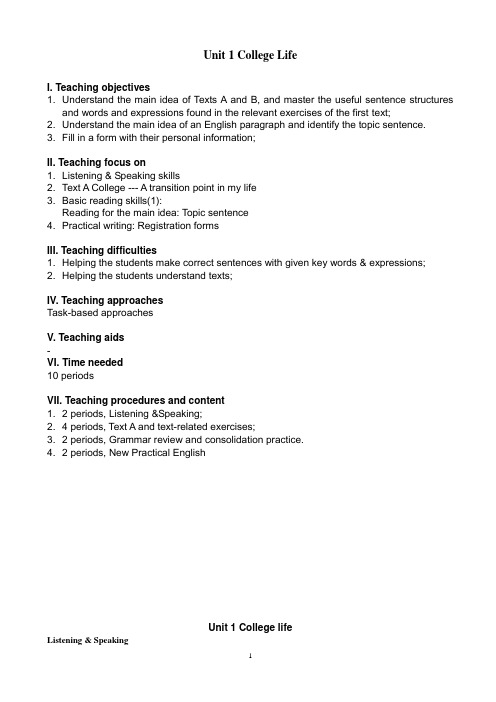
Unit 1 College LifeI. Teaching objectives1. Understand the main idea of Texts A and B, and master the useful sentence structuresand words and expressions found in the relevant exercises of the first text;2. Understand the main idea of an English paragraph and identify the topic sentence.3. Fill in a form with their personal information;II. Teaching focus on1. Listening & Speaking skills2. Text A College --- A transition point in my life3. Basic reading skills(1):Reading for the main idea: Topic sentence4. Practical writing: Registration formsIII. Teaching difficulties1. Helping the students make correct sentences with given key words & expressions;2. Helping the students understand texts;IV. Teaching approachesTask-based approachesV. Teaching aids-VI. Time needed10 periodsVII. Teaching procedures and content1. 2 periods, Listening &Speaking;2. 4 periods, Text A and text-related exercises;3. 2 periods, Grammar review and consolidation practice.4. 2 periods, New Practical EnglishUnit 1 College lifeListening & SpeakingLead inThe teacher explains the Lead-in so that the students will have some idea of what this unit is about. Then, the teacher writes the word “freshmen” on the blackboard and lets the studentsA. guess the meaning of the word;B. tell how they feel now that they are in college and what problems they have;C. have a look at the words and expressions in the box;D. watch the video and tell what is said in the video with help from the teacher;E. do the True or False exercise and watch the video again;F. exchange their views on life in college.Listening & SpeakingAfter the Lead-in, the teacher asks the students to do the following:1) Introducing YourselfA. Listen to the first half of the short talk in Ex. 1 twice and fill in the missing words;B. Listen to the second half of the short talk in Ex. 1 twice and fill in the missing words;C. Listen to the whole short talk and do Ex. 2.2) Getting to Know PeopleA. Go through the new words in Ex. 3 and listen to the conversation twice while filling in the missing words;B. Answer the questions by way of group discussion or the traditional teacher-student interaction;C. Do Ex. 4 in pairs;D. Go through the new words in Ex. 5 and watch the video twice while filling in the missing words;E. Do Ex. 6 in pairs. One student asks the question and the other student answers it. Then they switch roles anddo it again.3) Listening PracticeBefore ending class, the teacher tells the students how to do the exercises in Listening Practice as their homework. The teacher also tells the students that they should be prepared to answer the questions and give an oral presentation in class when they next come to class.Text A College – A Transition Point in My Life1) StarterAfter a brief explanation of the instructions, the teacherA. let the students list the things that they were excited and worried about when they first got to college. This can be done in complete English sentences or just phrases. If the students have difficulty doing this, the teacher should provide them with the following key words in English: (for things students may be excited about) beautiful campus, good library, teachers and classmates, the computer room, the environment, new way of life, etc.; and (for things students may be worried about) being away from home, the food, competition with other students, difficulties in study, washing clothes, taking a bath or shower, new teachers, etc.;B. organizes pair work or group discussion among the students, which should last for about 5 minutes only, and then gives the students 10 minutes to read Text A and find out the things that worried the writer when he first got to college.2) Text A: College — A Transition Point of My LifeThe teacherA. discusses the whole text with the students;B. guides the students through the exercises, focusing on certain items or leaving some exerci ses as the students’ homework a ccording to the students’ levels.Read the new words and expressionsParagraph 11. Transition: n. (instance of) changing from one state or condition to another 过渡;转变2. Title of Text A: Author Unknown: The name of this writer is not known. 佚名作者.Language Points1. Enter: vt. go or come into (a place) 进入 e.g. enter a room/ a house 进入房间/房子As soon as he entered the room, he saw his father and mother.他一进屋就看到了父母。
Unit-1-College-life
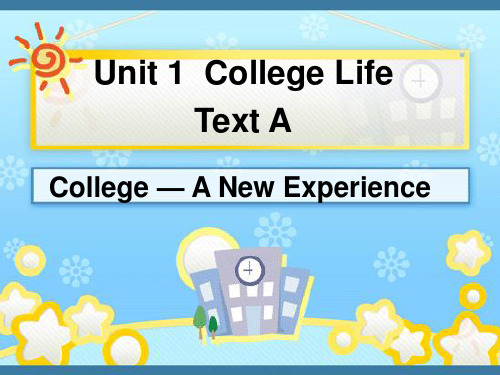
Para.3
When they found out I was looking for New Gerard, one said, “Oh, just follow us ; that’s where we’re going.” Even now I feel comfortable in the dorm because there are friendly people around to talk with.
19
Para.5
End
I do like things about college — being on my own, talking with friendly people, having Fridays off, but this doesn’t mean I don’t think about things at home. Although I like college, I can still get homesick: New York is a pretty good place, too.
4
savings['seiviŋ]n. a reduction in the
amount of time or money that is used or needed 储蓄(金) check[t ek]n. (=cheque)支票
aspect['æ spekt]n. a certain side of
many-sided state of affairs, idea, plan, etc. (问题、事物等的)方面
suppose[sə‘pəuz]v.1.(常用被动语态)
期望,认为应该 2.to think or believe
大学英语教程1(南方版)读写译 UNIT 1 COLLEGE LIFE

BACK
READING SELECTION: TEXT A
UNIT ONE
How to Adjust to College Life
Randall S. Hansen, Ph.D.
Perhaps you were class president in high school. You could have graduated in the top percentile of your graduating class; perhaps you were even valedictorian. Actually, it doesn¡t¯really matter what you did in high school as you make the transition to college. You start college with a clean academic slate, along with a lot of independence and a myriad of critical decisions as you begin the transition into adulthood. The decisions that you make and the actions you take during this first
大学英语通识教程第一册unit 1 College Life

of Bethlehem's historic district, which is home to the art and music departments.
Students travel the eight blocks between the campuses by college buses Moravian
boast two beautiful campuses. The main street campus which is in the center of
daily life for all Moravian students, and the Priscilla Payne Hurd Campus in the heart
cultural offerings, Moravian's handsome historic campuses, the community service
of its undergraduates, and its programs of graduate and professional education for
Unit 1 College Life
All-Dimension College English Book 1 大学英语通识教程(第一册)电子教案
Unit 1 College Life
I. Starter 1. Background information 2. Lead-in Video clip 3. Questions for discussion II. Detailed Reading 1. Structure analysis 2. Comprehension questions 3. Vocabulary & Expressions & Language points III. After Reading 1. Oral activity—video; questions 2. Proverbs and quotations 3. Practical Writing IV. Supplementary Reading 1. Lead-in notes 2. Detailed reading – Vocabulary & Expressions 3. Interaction
新视野视听说第一册UNIT1How's your college life课件

Matching
Viewing, Listening & Speaking
PENNSYLVANIA UNIVERSITY BLAZER BADGE
YALE UNIVERSITY BLAZER BADGE
BOOK 1- UNIT 1
Viewing, Listening & Speaking
Watching and Discussing
Matching
Viewing, Listening & Speaking
Can you figure out the Chinese names
of these world top universities of Ivy
League?
Harvard University
哈佛大学
Yale University
BOOK 1- UNIT 1
Matching
Viewing, Listening & Speaking
Can you match these blazer badges with the universities they present?
HARVARD UNIVERSITY BLAZER BADGE
BOOK 1- UNIT 1
Brainstorming
Viewing, Listening & Speaking
Besides traditional education, there emerge a lot of other forms of schooling especially with the development of Internet and telecommunications. Two major ones are virtual university (虚拟网络大学) and open university.
Unit-1-College-Life课文翻译大学休会英语一
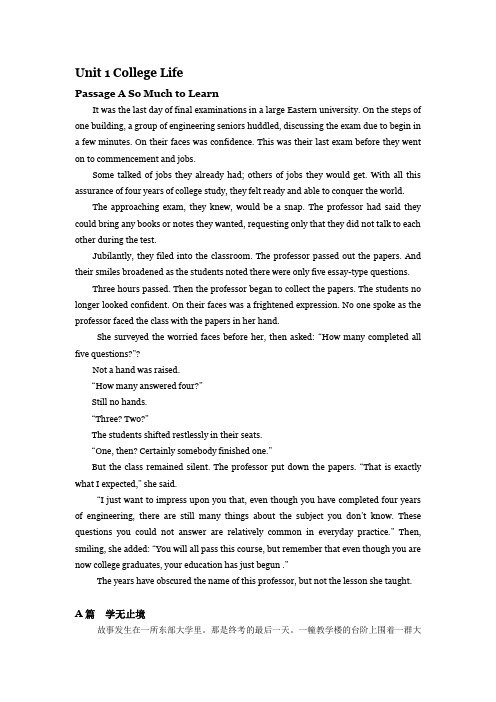
Unit 1 College LifePassage A So Much to LearnIt was the last day of final examinations in a large Eastern university. On the steps of one building, a group of engineering seniors huddled, discussing the exam due to begin in a few minutes. On their faces was confidence. This was their last exam before they went on to commencement and jobs.Some talked of jobs they already had; others of jobs they would get. With all this assurance of four years of college study, they felt ready and able to conquer the world.The approaching exam, they knew, would be a snap. The professor had said they could bring any books or notes they wanted, requesting only that they did not talk to each other during the test.Jubilantly, they filed into the classroom. The professor passed out the papers. And their smiles broadened as the students noted there were only five essay-type questions.Three hours passed. Then the professor began to collect the papers. The students no longer looked confident. On their faces was a frightened expression. No one spoke as the professor faced the class with the papers in her hand.She surveyed the worried faces before her, then asked: “How many completed all five questions?”?Not a hand was raised.“How many answered four?”Still no hands.“Three? Two?”The students shifted restlessly in their seats.“One, then? Certainly somebody finished one.”But the class remained silent. The professor put down the papers. “That is exactly what I expected,” she said.“I just want to impress upon you that, even though you have completed four years of engineering, there are still many things about the subject you don’t know. These questions you could not answer are relatively common in everyday practice.”Then, smiling, sh e added: “You will all pass this course, but remember that even though you are now college graduates, your education has just begun .”The years have obscured the name of this professor, but not the lesson she taught.A篇学无止境故事发生在一所东部大学里。
Unit 1 college life 【语法:名词】练习答案

大学英语综合教程(中职英语)Unit 1 college life【语法:名词】练习答案1.The storm has caused______to this region.A.many damages B.much damagesC.much damage D.few damages【答案】C【解析】damage是不可数名词。
【译文】暴风雨给这个地区造成了很大的破坏2.Our family ______ not to exchange gifts this year.A.has agreed B.have agreed C.agrees D.had agreed 【答案】B【解析】family 是个集体名词,但在不同的语境下游集体与个体之分。
此题突出家庭每个成员的个体,相互赠礼。
作为整体时用单数,强调集体概念。
【译文】我们家同意今年不交换礼物。
3.Good food,not _________,that’s how one gets fat. A.enough exercises B.exercises enoughC.enough exercise D.exercise enough【答案】C【解析】enough修饰名词时只能放在其修饰的名词前,而修饰形容词时要放在其后。
exercise作不可数名词时为“训练”。
【译文】食物好,锻炼少,这就是一个人长胖的原因。
4.The news of victory____spreading far and wide.A.areB.isC.have beenD. were【答案】B【解析】主语是news,是不可数名词,谓语动词用单数。
【译文】胜利的消息传遍四面八方。
5.All the____in this hospital will get a rise tomorrow.A. women-doctorB. woman doctorsC. women doctorsD. doctors of women【答案】C【解析】该题是语法题,考查合成名词的复数形式。
- 1、下载文档前请自行甄别文档内容的完整性,平台不提供额外的编辑、内容补充、找答案等附加服务。
- 2、"仅部分预览"的文档,不可在线预览部分如存在完整性等问题,可反馈申请退款(可完整预览的文档不适用该条件!)。
- 3、如文档侵犯您的权益,请联系客服反馈,我们会尽快为您处理(人工客服工作时间:9:00-18:30)。
SYN:intensify
v.become stronger and intensified. e.g. Tension has heightened after the recent bomb attack. 最近的炸弹袭击之后,情势更加紧张。 e.g.The campaign is intended to heighten public awareness of the disease. 这场运动的目的是使公众更加了解这种疾病。
e.g.Policies inherited from the previous administration. 沿袭上届政府的政策。 n.inheritance 继承物;遗产;继承 adj.inheritable可遗传的;有遗传性的 e.g.~ characteristics 可遗传的特征 3.inhibition n. a shy or nervous feeling that stops you from expressing your real thoughts or feelings.拘谨; 拘束感
e.g. He has inherited his mother's patience. 这种耐心是母亲遗传给他的。 v. if you inherit a particular situation from sb,you
are now responsible for dealing with it, especially because you have replaced that person in their job.接替(责任等;继任)
n. the act of restricting or preventing a process or an action.阻止;抑制;禁止 e.g. the inhibition of growth 对生长的抑制 n.inhibitor 抑制剂;阻聚剂
4.interaction: the act or process of interacting. n. ~(between sb/sth) the interaction between
e.g.The children were shy at first, but soon lost their inhibitions. 孩子们起初很羞涩,但很快就放开了。 e.g. She had no inhibitions about making her opinions known. 她敢于公开地谈论自己的想法。
Байду номын сангаас
performers and their audience. 演员与观众之间的 互动 ~ with sb/sth: the interaction of bacteria with the body's natural chemistry. 细菌和身体的天然化学变 化的相互作用 adj. interactive that involves people working together and having an influence on each other. 合作的;相互影响的; 互相配合的 e.g.The school believes in interactive teaching methods. 这所学校推崇互动教学法。 5.internalize
2.inherit
v. to receive money,property,etc.from sb when they die 继承(金钱、财产等) 【Collocation】inherit sth (from) sb
e.g.She inherited a fortune from her father. 她从她父亲那里继承了一大笔财富。 v. to have qualities,physical features,etc.that are similar to those of your parents,grandparents,etc. 经遗传获得(品质、身体特征等)
v. ~ sth: to make a feeling, an attitude, or a belief part of the way you think and behave. 使(感情、态度或信仰等)成为思想的一部分;使内 在化 e.g. Over time she internalized her parents' attitudes.
Unit 1 Your College Life
Word Explanation
1.heighten
v. if a feeling or an effect heightens,or sth heightens it, it becomes stronger or increases( 使) 加强,提高,增加
The end
Thank you for listening!
